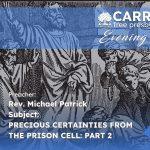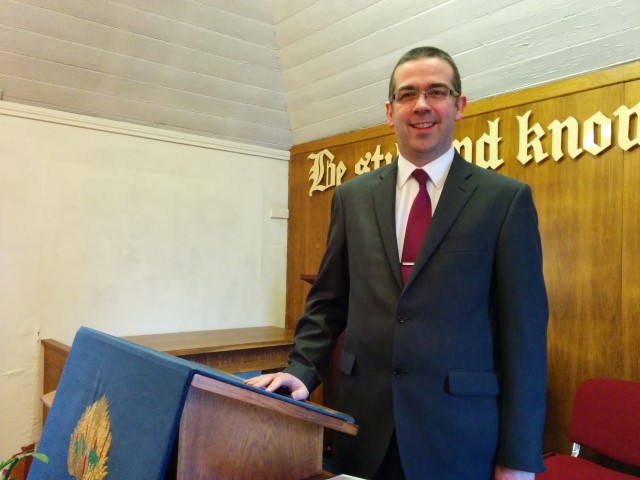Date: SUN 11:30am 27th July 2025
Preacher: Rev. Michael Patrick
Bible Reference: Philippians 1:6
Being confident of this very thing, that he which hath begun a good work in you will perform it until the day of Jesus Christ:
Sermon Summary: Philippians 1:1-11
The sermon, based on Philippians 1:1-11, focuses on the Apostle Paul’s letter to the church in Philippi, written from a Roman prison. The preacher expounds on Paul’s heartfelt gratitude, confidence, and prayers for the Philippian believers, drawing out key theological and practical insights for the congregation.
Introduction and Context
The sermon begins with a reading of Philippians 1:1-11, where Paul, alongside Timothy, addresses the believers in Philippi, including its bishops and deacons. Paul expresses his gratitude and affection for the church, his confidence in God’s ongoing work in them, and his prayer for their spiritual growth. The preacher sets the scene: Paul is imprisoned in Rome, yet his letter is filled with joy and encouragement, reflecting on his fond memories of the Philippian church and their steadfast faith.
Paul’s tone is warm and personal. He writes from a prison cell, yet his focus is not on his suffering but on the faithfulness of the Philippians and God’s sustaining grace. The preacher highlights Paul’s joy in recalling the church’s fellowship in the gospel (v. 5) and his unshakable confidence in God’s continued work in their lives (v. 6).
Key Themes and Exposition
1. Paul’s Gratitude and Affection (vv. 3-7)
Paul begins by thanking God for the Philippians, noting that every memory of them brings him joy (v. 3). The preacher emphasises that the Philippians are in Paul’s heart (v. 7) and prayers (vv. 4, 9), underscoring the deep bond between the apostle and the church. This affection stems from their shared commitment to the gospel, which they have faithfully supported “from the first day until now” (v. 5). The preacher connects this to the joy ministers feel when they see believers continuing steadfastly in faith, drawing from personal experiences of witnessing thriving congregations in places like Coragarry, Ardaragh, and Lurgan.
Paul’s gratitude is not merely for past fellowship but for the Philippians’ ongoing faithfulness. The preacher notes that this steadfastness is a source of immense encouragement, reflecting the joy of seeing God’s work prosper in the lives of believers.
2. Confidence in God’s Work (v. 6)
The sermon’s central focus is verse 6: “Being confident of this very thing, that he which hath begun a good work in you will perform it until the day of Jesus Christ.” The preacher describes this as a key verse in the letter, quoting Dr. Martyn Lloyd-Jones, who viewed it as foundational to Paul’s message. Paul’s confidence is not in human effort but in God’s faithfulness to complete the work He has started.
The preacher breaks down this verse into three main points:
a. Whom this confidence concerns: The “good work” refers to the internal, transformative work of God’s grace in the souls of believers. This is not mere external religion but the regenerating work of the Holy Spirit, as exemplified in the necessity of being “born again” (John 3:3). The preacher challenges the congregation to examine whether they have experienced this spiritual quickening, asking if they are conscious of God’s life in their souls and if they hunger for His Word.
This good work is described as:
- Good because it renews believers in God’s image, making them new creatures in Christ (2 Corinthians 5:17).
- Good because it enables communion with God, the greatest good, by cleansing from sin and clothing believers in Christ’s righteousness.
- Good because it glorifies God, bringing sinners from idolatry and darkness into the fellowship of God’s family (1 Peter 2:9).
The preacher stresses that salvation is entirely God’s work, not human effort, citing Jonah’s declaration, “Salvation is of the Lord” (Jonah 2:9), and Ephesians 2:8-9, which underscores salvation by grace through faith, not works. Unlike other religions that rely on human merit, biblical Christianity rests on God’s initiative and power.
b. What this confidence is based upon: Paul’s confidence lies solely in God, not in his own ministry or the Philippians’ faithfulness. The preacher highlights that Paul, despite his significant role in founding the Philippian church, attributes all success to God’s grace (1 Corinthians 15:10). This confidence is rooted in God’s unchanging nature (Malachi 3:6), inexhaustible resources, and unwavering faithfulness to His promises. Unlike human projects that falter due to changing circumstances or limited resources, God’s work is certain to reach completion.
The preacher illustrates this with examples of unfinished human endeavours (e.g., buildings left incomplete due to lack of funds or death) but contrasts these with God’s unlimited power and fidelity. God’s promises, sealed by Christ’s blood, ensure that He will complete what He has begun.
c. What this confidence anticipates: The phrase “will perform it until the day of Jesus Christ” points to the ongoing and ultimate completion of God’s work. The Greek word for “perform” implies a continuous process leading to a final consummation. The preacher explains that salvation is not a one-time event but a progressive work involving growth, maturity, and sanctification. Believers are described as “babes in Christ” who grow toward spiritual maturity (1 Corinthians 3:1).
The “day of Jesus Christ” refers to Christ’s return, when believers will be fully glorified and made like Him (1 John 3:2). The preacher uses the analogy of an artist adding finishing touches to a painting, with the final stroke occurring at Christ’s return, when believers will be perfected in holiness and glory.
Application and Encouragement
The sermon concludes with a powerful application of verse 6 as a source of encouragement for believers. Despite feelings of weakness, failure, or spiritual struggle, Christians can rest in the assurance that God, who began the work, will complete it. The preacher shares anecdotes of believers feeling overwhelmed, likening their struggles to wrestling against “storm and wind and tide” (a reference to a hymn). Yet, Paul’s words offer hope: God’s grace is sufficient to sustain and perfect His people.
The preacher addresses objections to this doctrine, particularly the claim that assurance of God’s preservation leads to spiritual laziness. He counters this by comparing believers to athletes or entrepreneurs whose confidence drives them to greater effort, not complacency. Similarly, Paul’s confidence in God’s work does not hinder his exhortations to the Philippians to press on (Philippians 3:14) or his fervent prayers for their growth (vv. 9-11).
The congregation is urged to respond by:
- Looking to Jesus daily, as the “author and finisher” of their faith (Hebrews 12:2).
- Trusting in God’s promise to complete His work, even in times of struggle.
- Living with expectancy, knowing that God’s grace will sustain them until Christ’s return.
Personal Illustrations
The preacher weaves in personal reflections to connect with the congregation:
- He recounts the joy of seeing God’s work prosper in places like Coragarry, Ardaragh, and Lurgan, where he ministered early in his career.
- He shares his own conversion story, recalling how he initially resisted salvation, believing he could not live the Christian life. His pastor, Dr. Paisley, reassured him that God’s grace would sustain him, echoing the truth of Philippians 1:6.
- He imagines the Philippian believers, such as Lydia and the Philippian jailer, hearing Paul’s letter read aloud and rejoicing in God’s transformative work in their lives.
Conclusion
The sermon closes with a call to trust in God’s faithfulness and to live in dependence on His grace. The preacher encourages believers to pray for strength, seek God’s guidance, and rest in the promise that He who began a good work in them will bring it to completion. The sermon is both a doctrinal exposition of God’s preserving grace and a heartfelt exhortation to live with confidence and hope in Christ.
Key Takeaways
- Paul’s joy and prayers for the Philippians reflect the deep bond between a minister and a faithful church.
- The “good work” of salvation is God’s initiative, transforming believers inwardly and enabling communion with Him.
- God’s unchanging nature, unlimited power, and faithful promises guarantee the completion of His work in believers.
- This truth is a source of encouragement for struggling Christians, assuring them that God will sustain them until Christ’s return.
- Believers are called to look to Jesus, trust in His grace, and persevere in faith, confident in God’s ultimate victory.
The sermon is delivered with passion and pastoral warmth, blending theological depth with practical application, and is firmly rooted in the text of Philippians 1:1-11.
Subscribe to the podcast here:
Spotify Podcasts | Apple Podcasts | Pocket Casts
Email | RSS | more information here







